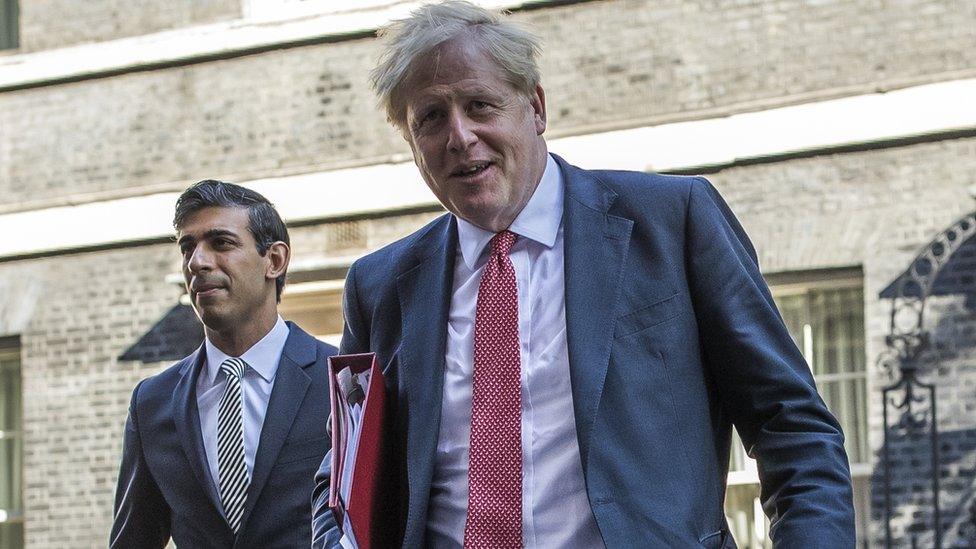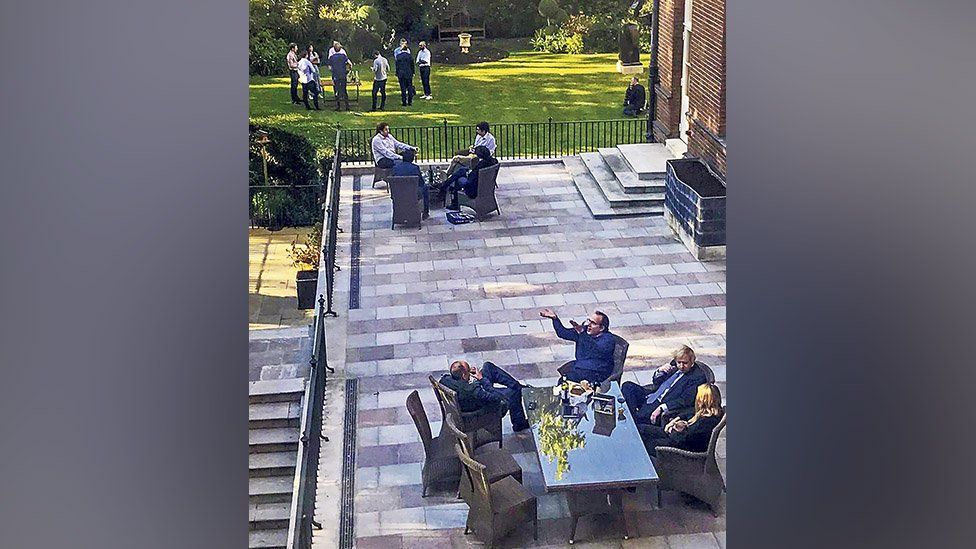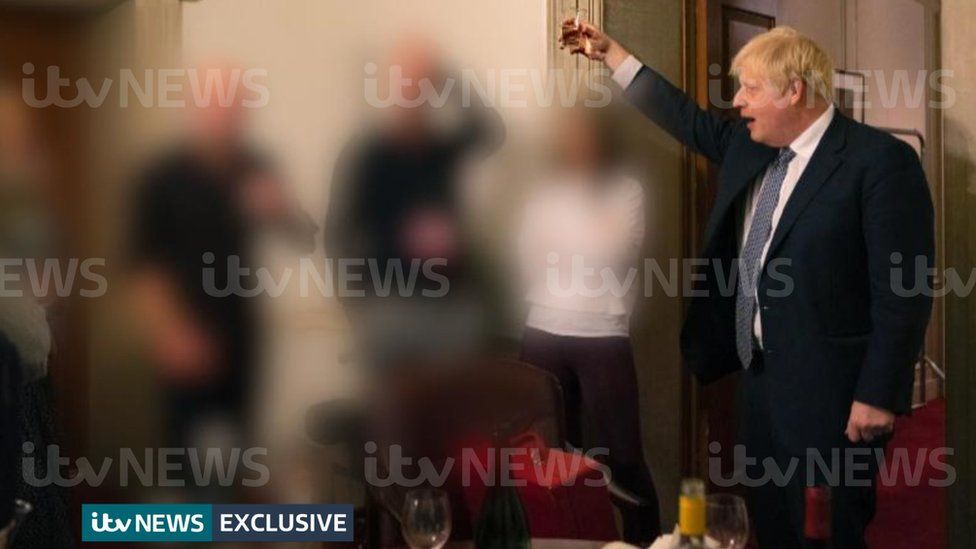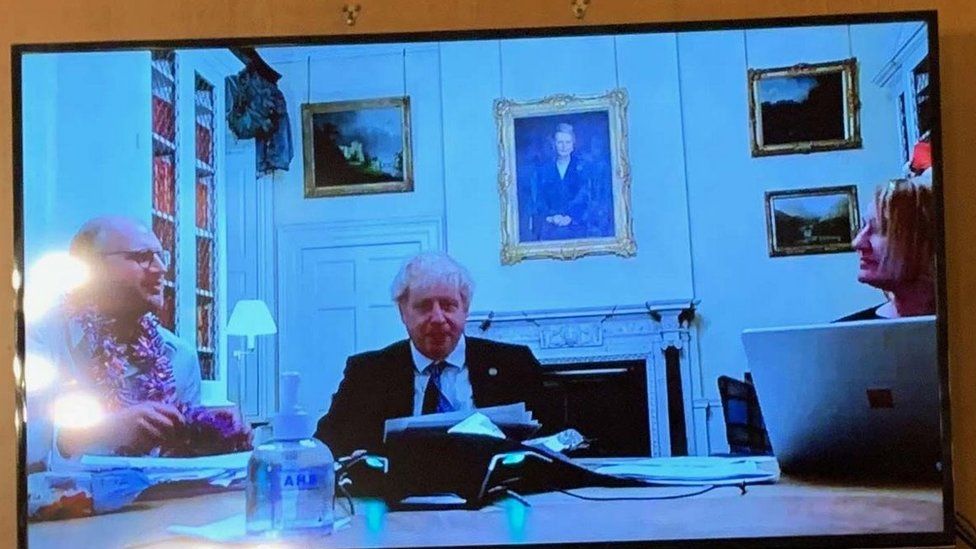Partygate: Which Downing Street parties have resulted in fines?
- Published

Boris Johnson and Chancellor Rishi Sunak have both been fined
The Metropolitan Police have issued a total of 126 fixed penalty notices have been issued over lockdown events in and around Number 10.
The Mayor of London, Sadiq Khan, has asked them to explain how they decided who to fine at the gatherings.
This follows news that the Prime Minister was fined for attending a birthday party at Number 10, but not for attending a leaving do.
The police have told the mayor that they do not comment on individual cases.
What fines have been issued?
The Met says the fines were issued to 83 individuals, with 28 people receiving between two and five fines.
Of the 126 fines, 53 fines were issued to men and 73 to women.
Prime Minister Boris Johnson received a fine relating to a gathering for his birthday, in Downing Street on 19 June 2020. His wife Carrie and Chancellor Rishi Sunak were also fined over the party.
There have also been fines for events on other dates:
20 May 2020 - a garden party attended by the PM, to which staff were invited to "bring your own booze"
18 June 2020 - a civil servant's leaving party - the government's former head of ethics, Helen MacNamara, confirmed she had received a fine for this one
13 November 2020 - there were two gatherings - one to mark the departure of a special adviser and one in the Downing Street flat. We do not know which one the fines were issued for
17 December 2020 - three events took place: two for the departure of officials and a Christmas quiz. We do not know which one the fines were issued for
18 December 2020 - a Christmas party joked about in a leaked Downing Street press conference video
14 January 2021 - a gathering was held in Downing Street for the departure of two No 10 private secretaries
16 April 2021 - a leaving party for the former No 10 director of communications, James Slack
Which gatherings have not led to fines?
On dates when there was more than one gathering investigated, we do not know which event led to the fines.
Sue Gray's initial report, external referred to 16 gatherings in Downing Street and the Cabinet Office. Not all of them were investigated by the Metropolitan Police.
The report said police decided that four of the gatherings were not considered to have reached the threshold for criminal investigation:
15 May 2020 - staff were pictured in the Downing Street garden, external with wine and cheese
27 November 2020 - a gathering for the departure of No 10 aide Cleo Watson
10 December 2020 - a gathering in the Department for Education canteen ahead of the Christmas break
15 December 2020 - a Christmas quiz - photos of the PM taking part were published by the Daily Mirror, external
While the 15 December Christmas quiz was on the list of gatherings that were not going to be investigated by police, that decision was reviewed following the publication of a photo of the event, external. However, no fines were later issued.
How did police decide who to fine?
The Mayor of London, Sadiq Khan, asked the Metropolitan Police to explain why they fined the prime minister for attending a birthday party in Downing Street on 19 June 2020 but did not fine him for attending a leaving event for former communications director Lee Cain on 13 November, 2020.
A reply from Acting Commissioner Sir Stephen House says the police could not comment on individual cases, for fear of identifying individuals.
However, he said, every case had been "examined meticulously" and that the investigations had been carried out "carefully and impartially".
Sir Stephen said police investigators had to take into account a number of factors before imposing a fine, such as the amount of time a person had stayed at an event and whether it had been work-related.
What is the Sue Gray report?
The police investigation was launched after the initial findings, external of a separate inquiry by senior civil servant Sue Gray.
Her full report was delayed until police investigations ended and published on 25 May. It gives details of 16 events between May 2020 and April 2021, 12 of which were investigated by the police.
Ms Gray says that "what took place at many of these gatherings and the way in which they developed was not in line with Covid guidance at the time".
She blames senior politicians and officials for "failures of leadership and judgment in No 10 and the Cabinet Office".
What has Boris Johnson said?
Since being fined, the prime minister has already said he "fell short" of his own rules and people "had the right to expect better" from him.
Opposition parties say he misled Parliament when he told MPs no rules were broken.
What is a fixed penalty notice?
The fixed penalty notices (FPNs) are for breaking Covid laws.
Every Metropolitan Police decision to issue FPNs in relation to "partygate" goes to Acro, the criminal records office for England and Wales.
Dame Cressida Dick announces the Met Police's investigation into No 10 lockdown parties
It receives and processes the payments required from each person found to have broken the law.
That means there is an official record on the system - but it is not a criminal record that must be disclosed.
If someone doesn't pay an FPN, then it becomes more serious. The notice will be referred to the courts. In the worst case scenario, a magistrate could issue a warrant for someone to be arrested and hauled before them for non-payment.
Challenging an FPN is complicated and has been much criticised as potentially unfair by expert lawyers.
Sometimes an individual police force may reverse a decision after direct lobbying.
The alternative is to argue it out in court. But that is expensive - and losing leads to a criminal conviction as it's a criminal court ruling.



